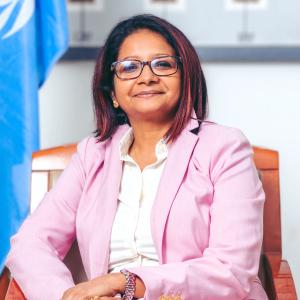Welcome Remarks by; UNRCO Head of Office, Ms. Shabnam Mallick Capacity Development and Consultation Workshop on Public Service Management and Data Governance Framework Dodoma
- Dy Permanent Secretary President’s office
- Mr. Benedict Ndomba Director General, e-Government Authority
- Director General, Personal Data Protection Commission
- Mr. Juwang Zhu, Director, Division for Public Institutions and Digital Government - United Nations Department of Economics and Social Affairs (UNDESA)
- Senior members of the Govt.
- Members of the Academia
- My UN colleagues
- Distinguished guests, ladies and gentlemen
A very good morning!
It is a great pleasure to join you today for this important workshop. This workshop is convened by the UN Department of Economic and Social Affairs (UN DESA) in collaboration with the President’s Office and the e-Government Authority of Tanzania. I commend UN DESA and all its partners for this vital initiative, as it speaks directly to the intersection of governance, technology, and sustainable development—a space where data and digital transformation are more critical than ever.
We have a lot of work ahead of us. Despite our best efforts, we find ourselves trailing behind in our collective pursuit of the SDGs by 2030. Alarmingly, over one-third of the SDG targets have shown no progress, and some have regressed below the baselines established in 2015.
The digitalization of public services is a powerful catalyst for achieving the Sustainable Development Goals (SDGs). By leveraging technology, governments can enhance efficiency, transparency, and inclusivity in service delivery, ultimately contributing to a more sustainable future.
Data capabilities in public service also needs redoubled attention-- not only as in our rapidly evolving world, data, technologies, and digital transformation are increasing pivotal capabilities, but as the technology itself is changing fundamentally.
Artificial Intelligence (AI) is rapidly transforming the landscape of public service management and data governance. Its ability to process vast amounts of data, identify patterns, and make predictions offers unprecedented opportunities to enhance efficiency, transparency, and service delivery. We are now faced with the prospect of applying AI to traditional data governance role and how these cutting-edge technologies can accelerate development across all sectors, fostering innovation, and unlocking novel opportunities for growth and sustainability.
One key obstacle in this journey is the persistent data gaps and digital divides, gaps that are also present here in Tanzania. These divides hinder our ability to fully harness the benefits of digitalization and, consequently, the sustainable future we all strive for. To overcome this, strategic investments in data, artificial intelligence, and digital skills must be at the forefront of our efforts.
Other challenges such as data privacy and cybersecurity must be addressed. Overcoming these challenges would require a comprehensive approach that includes investments in digital infrastructure, capacity building, and policy frameworks. By effectively leveraging digital technologies, governments can mitigate challenges and accelerate progress towards the SDGs and create a more inclusive, sustainable, and resilient future for all.
It is in this context that I wish to highlight an exciting new UN Joint Programme that we are launching here in Tanzania: the Data for Digital Agricultural Transformation (2024-2027). This programme, led by UNCDF, FAO, IFAD, and supported by the UN Resident Coordinator’s Office, marks a significant step forward in enhancing the capacity of Tanzania’s Ministry of Agriculture to manage data and digital solutions for agricultural development. This Joint Programme aims to strengthen existing data systems, improve interoperability, and establish a comprehensive data framework with operational guidelines. It will work closely with various government bodies, including the Personal Data Protection Commission, the Electronic Government Authority, and the ICT Commission, to support the broader national objective of developing digital public infrastructure.
A key focus of the programme is building the capacity of agri-tech companies through a data-focused accelerator program. This initiative will enable national agri-techs to create innovative, customer-centric products and services, particularly benefiting women and youth smallholder farmers. The programme plans to register and train 500,000 farmers, with a significant emphasis on women (60%) and youth (20%), equipping them with access to mobile and web-based extension services like M-Kilimo and Ugani Kiganjani. This will enhance their ability to optimize farming practices using AI and machine learning, helping them to increase productivity and income.
Ladies and Gentlemen,
In our race toward digital transformation, we must not forget those who are most in need. The poorest populations, women, persons with disabilities, migrants and refugees, indigenous people, and those living in rural and remote areas must remain central in our efforts. In this endeavor, we must ensure that no one is left behind as we strive to enhance data and digital capabilities, bridge the digital divide, and advance sustainable development for all.
This goal aligns with the work of the United Nations Resident Coordinator’s Office and other UN agencies in Tanzania. We reaffirm our joint commitment to continue supporting the Government of Tanzania in driving sustainable and inclusive development. Our shared mission is to create a future that is not only prosperous but equitable and accessible for every individual in this country.
Let today’s dialogue serve as a catalyst for the exchange of ideas and solutions—solutions that will propel us toward a more inclusive, hybrid-digital future. Let us seize this moment to make tangible progress on the road to sustainability, innovation, and social justice.
I wish this workshop every success. Let it be a milestone in our journey toward a better, data-driven, and sustainable future for all.
Asanteni Sana!















